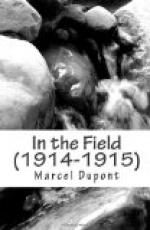Yes, there he was, coming to meet me on the hard road. It was a joy to me that chance had given me this jolly fellow for my trench companion. I hardly knew him, for he had not been with us more than a few days. Taken from the Military College directly war was declared, he had first been sent to a reserve squadron, and had only just been appointed to an active regiment. But I already knew, through my comrades of the first squadron, that he was a daring soldier and a merry companion. So much the better, I thought. War is a sad thing, and one must learn to take it gaily. A plague on gloomy spirits and long faces! True, we can no longer wage the picturesque war of the “good old days.” We shall never know another Fontenoy, or Rivoli, or Eylau. But that is no reason why we should lose the jovial humour of our forefathers. Thank Heaven! we have preserved their qualities of dash and bravery. But it is more difficult to keep a smiling face in this hideous mole warfare, which is imposed even upon us troopers. All the more reason for liking and admiring the cheery officers who keep our spirits up, and G. is one of them.
We shook hands without speaking, for it seemed to us that if we opened our mouths the frost would get into our bodies and freeze them, and we set off at a sharp trot along the narrow by-road which, crossing the high-road to Paris, leads to C. There we should have to leave our horses, cross the zone of the enemy’s artillery fire, and get to the trenches on foot. The horses snorted with pleasure, happy to warm themselves by rapid movement. Some of them indulged in merry capers, which were repressed, not too gently, by their more sedate riders. Their hoofs struck the uneven ground with a metallic ring which must have echoed far; and the clink of bits and stirrups also disturbed the sleeping country. Before us the road ran straight amidst the dark fields, a long pale grey ribbon. No one thought of laughing or talking; sleep seemed still to hover over the column, and every one knew that the two days of trench duty would be long and hard to get through even if the Prussians left us in peace.
We passed a cross, which shone white on the side of the road under the pale light of the moon, and saluted it. We had known it from the first days, and had its inscription by heart:
80 NON-COMMISSIONED OFFICERS,
CORPORALS, AND SOLDIERS
OF THE 39TH AND 74TH REGIMENTS OF
INFANTRY,
KILLED IN ACTION.
PRAY FOR THEM.
We dimly discerned the modest wreaths of green leaves, now faded and yellow, and the little nosegays of withered flowers attached to the arms of this cross, left there after the departure of the regiment and undisturbed by any sacrilegious hand.
We crossed the Paris road, with its double row of trees, which, in the night, appeared gigantic, and, after answering the challenge of the Territorial guarding the approach to C., we entered the village.




